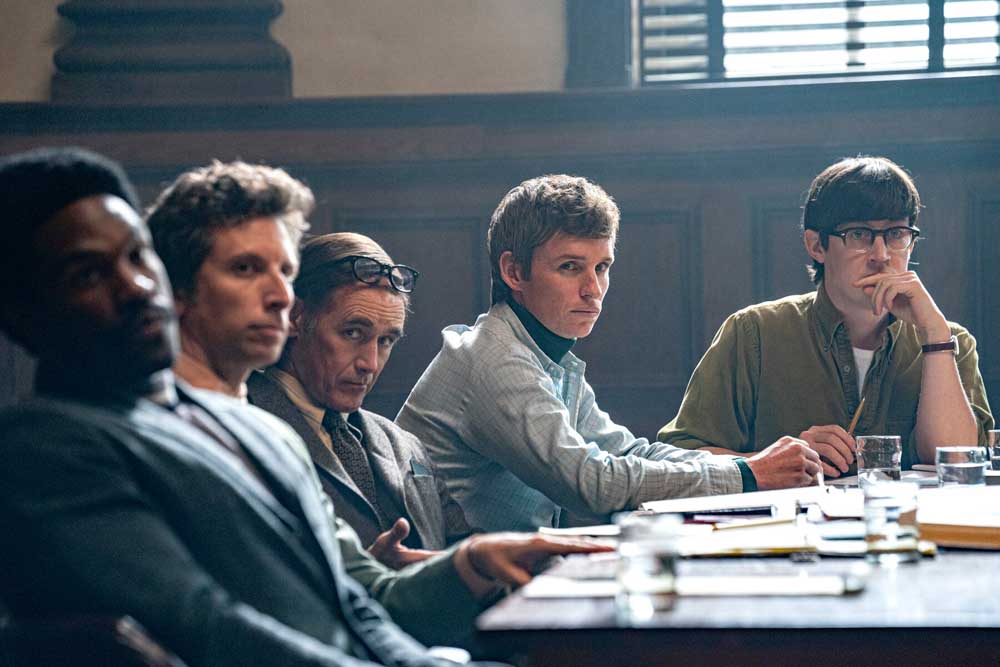Movie review: ‘The Trial of the Chicago 7’
Published 2:00 am Thursday, October 22, 2020

- From left: Yahya Abdul-Mateen II, Ben Shenkman, Mark Rylance, Eddie Redmayne and Alex Sharp in a scene from “The Trial of the Chicago 7.”
Writer and director Aaron Sorkin may not be surprising, but he can still churn out compelling political drama. There is definitely a Sorkin-esque formula that he’s perfected over the years, spanning from his early writing credits with the play and screenplay for “A Few Good Men” to his creation of one of the best television shows of all time with “The West Wing.” Now Sorkin brings all his beautifully eloquent dialogue complete with walking and talking and perfectly timed monologues to a 1969 Chicago courtroom with the Netflix original “The Trial of the Chicago 7.”
Based on the 1968 Chicago riot that was sparked from tensions with Chicago Police and anti-Vietnam protesters demonstrating in Grant Park near the Democratic National Convention, the film version rockets through the nearly five-month trial giving a compelling and infuriating picture of events.
Trending
It begins with juxtaposed archive footage from 1960s newscasts and the activists who would later be known as the Chicago 7 as they prepare for the demonstrations in Chicago in August of 1968 all set with some jaunty music as information whizzes by in a way that only Sorkin can do and not get tripped up.
Then we jump a year, and the trial begins.
We learn about the events leading up to and surrounding the riot as the prosecution, led by U.S. Attorney Richard Schultz (Joseph Gordon-Levitt) sets out its goal of imprisoning the group of seven protesters and Bobby Seale (Yahya Abdul-Mateen II), a founder of the Black Panther Party, who is clearly only lumped into the group to make them all seem “scarier” to the jury, for conspiracy charges.
Over the next two hours, the courtroom drama unfurls, evoking some humor from Yippie defendants Abbie Hoffman (Sacha Baron Cohen) and Jerry Rubin (Jeremy Strong) and horror over the clearly biased Judge Hoffman (Frank Langella), supposed jury tampering from the prosecution and the gut-wrenching image of Seals being dragged out of the courtroom to be gagged and chained upon his return.
As the trial unfolds, we learn a little about the activism these men were a part of, bleeding for their beliefs and railing against the system that had wronged them, thousands of young men like them and the people of Vietnam.
The events that led up to their indictments are doled out little by little until we see the final act of violence between the demonstrators and police outside the Haymarket bar near the convention.
Trending
All the actors bring their A-game to their roles. Even the fewer than 10-minutes Michael Keaton is on screen for his performance as former Attorney General Ramsey Clark is a great punch.
But Yahya Abdul-Mateen II really shines as Bobby Seale. His emotional restraint and eventual explosion in the face of blatant discrimination is powerful.
My only quibble with the acting comes from Jeremy Strong’s choice to give Jerry Rubin a Tommy Chong-style speech pattern. It feels disingenuous and stereotypical especially when you compare it to archive footage of the actual Rubin .
The film never feels its length too much; since there is so much information to receive, the two-hour runtime is warranted. It can get a little muddy with the facts, though.
Broad strokes, the events in the film did happen. Were many of them overly dramatized? Yes. Does it ruin the film? Not really.
What makes the film really work, though, is the timing of it. Sorkin wrote the script in 2007 with the intent of Steven Spielberg directing it. Through a few almost-starts, he took the reins himself, and it is incredible how close to present-day activism and tensions it comes, reminding viewers that while history may not repeat itself, it certainly rhymes.
“The Trial of the Chicago 7”
129 minutes
Rating: R for language throughout, some violence, bloody images and drug use
3.5 stars








